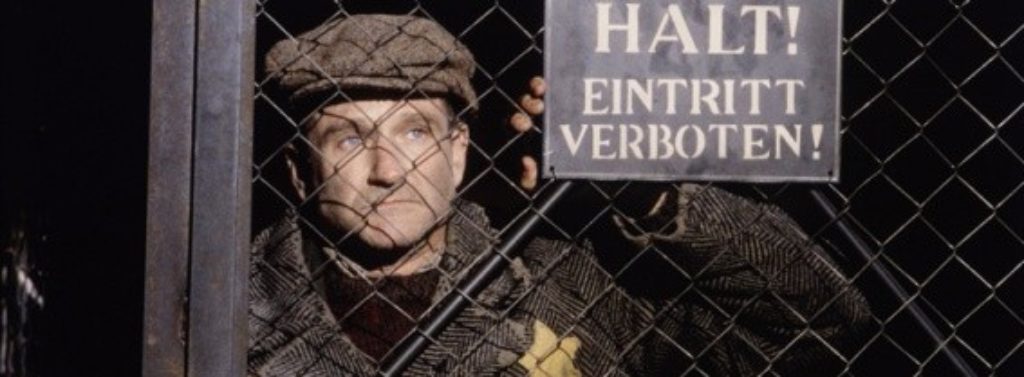
In 1944 Nazi-occupied Poland, former pancake vendor Jakob Heym accidentally overhears a radio news bulletin suggesting that the Soviet army is successfully advancing on German forces. He takes this news back to the “ghetto” as a sliver of hope for friends in desperate need of it. They eat it up. It doesn’t take long for rumors to spread about Jakob’s reported pipeline to the outside world. His Jewish friends are under the false impression that he owns a radio, which is nothing short of communications contraband. After several attempts to straighten out the misunderstanding, he discovers that it’s easier, and quite possibly in everyone’s best interest, if he simply lets them continue to believe the lie. They eagerly anticipate his daily reports that suggest WWII may soon be over. One of those delightfully deceived fans is a 10-year-old girl named Lina who strikes up a friendship with Jakob after her parents are taken to a concentration camp. Eventually the Nazis set out to cleanse the ghetto and, in the process, find the radio they’ve been told exists. Think of Jakob the Liar as Schindler’s List Lite. Despite some humorous moments, this is ultimately a tragic tale true to the horror of the Holocaust. Many characters die, either from Nazi guns or at their own desperate hands. But behind those individual stories, the film poses an overarching question: “Are people better off with dark truth or false hope?”
Positive Elements: Characters face moral dilemmas bravely. A few even put themselves in danger in order to rescue or give hope to others. While initially reluctant to unofficially adopt Lina, Jakob loves and cares for her as he would his own daughter. Any viewer with a conscience should walk away from this movie realizing how tremendously blessed (read: spoiled) we are in the United States, having been given a heart-rending reminder of the persecution so many people endured during WWII.
Spiritual Content: A few Jews find hope in the God of their forefathers. However, it is disappointing to hear so many of them questioning God’s goodness and provision. For example, Frankfurter responds to “Jews put their trust in God” by saying, “That line of reasoning hasn’t gotten us very far.” Elsewhere, he assesses their plight and indicates that he thinks God did a poor job of leading his people out of bondage if it was only to land them in concentration camps. Jakob, who doesn’t observe Jewish Sabbath, states, “I believe we are the chosen people, but I wish the Almighty had chosen somebody else.” Kowalski flippantly questions if God is really “up there.” In a back room, Frankfurter’s wife is shown briefly leading a seance of sorts and talking to spirits (I’m not Jewish, but it seemed more occult than kosher). All of this wouldn’t have been so upsetting had the filmmakers balanced momentary crises of confidence in God with occasions of deeply felt faith. Positive references to God and his ability to deliver His people are virtually non-existent.
Sexual Content: An engaged couple shares a bed, though any sex would have to be inferred.
Violent Content: Several Polish Jews are shot by Nazi soldiers (we learn that Jakob’s wife met a similar fate). Four are shown hanging from gallows in a vacant courtyard. A cart wheels through the ghetto streets, collecting dead bodies. Gestapo officers beat people with clubs. A man hangs himself. Another commits suicide by swallowing a pill rather than betray his people or help the Germans. Jakob is tortured for information by being held underwater and beaten bloody.
Crude or Profane Language: One “d–n” and two uses of “bastard.” That’s it.
Drug and Alcohol Content: Jews break out a bottle of something alcoholic to celebrate the election of Jakob as their leader. Men smoke cigarettes. A German officer drinks wine.
Summary: This alternately playful and despairing treatment of the Holocaust will inevitably invite comparison to Roberto Benigni’s celebrated Life Is Beautiful. That’s a tough act to follow. But taken on its own terms, Jakob the Liar is a solid, thoughtful tale built around likable characters in dire straits. Robin Williams is terrific as Jakob, and smart supporting players provide an engaging combination of pathos and comic relief. The movie deserves its PG-13 rating due to a gritty portrayal of Nazi oppression including violence that, while not gratuitous, is still disturbing. But parents and older teens will find much to talk about. Freedom. Hope. Courage. Truth. Just don’t expect Williams and company to sugar-coat this tragic period in history by wrapping things up with a Hollywood “happily ever after.” Rather than run the risk of trivializing material that should make audiences both contemplative and uncomfortable, the filmmakers chose to show respect for those who endured hellish persecution. If only we could have seen a little more reverence toward the loving God who was not idle in the midst of it all, but was a source of strength for many Jews.
